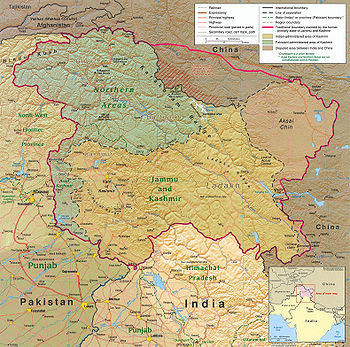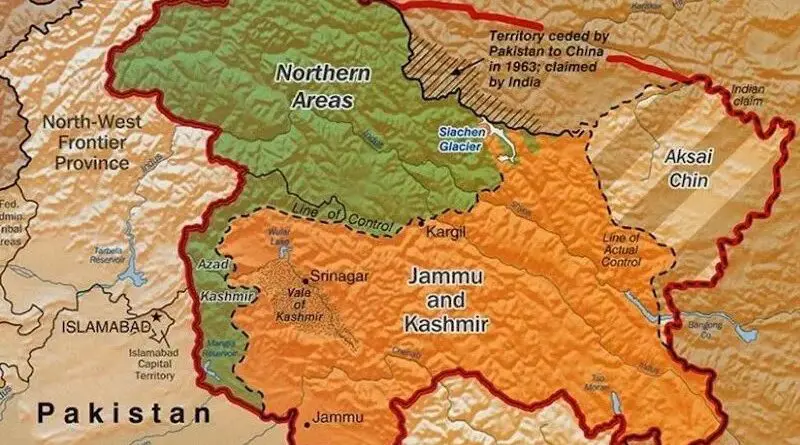Jammu And Kashmir: Peace Trade At Peril Again – Analysis
By Zafar Iqbal
Trade at Line of Control (LoC) in divided regions of Himalayan state of Jammu and Kashmir is facing enormous dangers due to periodic disruptions caused by out dated administrative procedures, unethical bureaucratic practices and continuous protests of trader fraternity over lack of necessary facilities and unfulfilled promises of Indian and Pakistani governments.
Now Cross LoC trade has been marred again when traders parked and stationed over 50 loaded trucks in protest in front of the buildings of local parliament in Muzaffarabad, the capital of Pakistani Kashmir, blaming Pakistani tax officials for bribery and other anti- trade practices. Traders complain that the Pakistani custom officials were forcing them to pay bribe over trade goods. ‘Officials raise tax duty when traders turn down their demands of kickbacks,” accuses Pervez Shah, a trader from Pakistani administrated Kashmir. Businesses say that it is exclusively a tax-free trade initiated by the governments of India and Pakistan as a major Confidence Building Measure (CBM) to boost peace process between India and Pakistan by improving socio-economic ties between divided regions of Kashmir. After over 61 years trade links were resumed between Pakistani and Indian divided state of Jammu and Kashmir on October 21 2008 as a part of remarkable peace process started between Islamabad and New Delhi.
Both the nations agreed to increase peace and defuse tension caused by 2001 attack on Indian parliament by Islamic insurgents. They also declared ceasefire along the Line of Control (LoC), where decade old exchange of armed shelling have claimed a large number of civilian and military lives on both sides since 1989 when an insurgency erupted in Indian Kashmir.
Trade activity between divided regions of Kashmir, commonly known as Cross-LoC trade has witnessed a series of adversaries since its much hyped commencement. Bureaucratic procedures; bizarre absence of face to face interaction among traders, lack of basic communication and modern logistics facilities and the most prominently its reliance on centuries-old barter trade system are few noteworthy shortcomings which escalate worries and concerns of business community.
In spite of such logistical, financial and communication predicaments, the trade has received amazingly positive response from business community and general masses in both the regions. Consequently, it is flourishing year by year impressively, albeit with chance of higher progress, if flaws are redressed.
It has been estimated that trade from the Indian side was worth about Rs.179 crore ($35 million), while that from Pakistan was Rs.300 crore in Pakistani currency ($33 million) till Oct 31, 2011. During last three years approximately 3,800 Lorries of goods have gone to Pakistan from the Indian side and about 3,700 trucks have come from across the border via two routes.
It has boosted economic activities in a region which has been under the shadows of war, mistrust and hatred since decades, but now trade has caused building public- to- public contacts, specifically reunion of divided people separated in dreadful partition of British India. It is building socio- economic development of the region as well.
Beside incompetence of government functionaries and highly tighten processes, the trade is under consistent threat of non-state actors like Islamic militants which operate in Himalayan Kashmir. And current improved trade relations between India and Pakistan, which are also the handlers of cross LoC trade, have intensified the resentments of pro-Jehadi elements.
Recently, Pakistan has granted the status of ‘Most favorite nations (MFN)’ to its neighboring India which annoyed different right wing religious parties and Islamic militants in Pakistan and its controlled Kashmir. Hard-core militant group Jamaat-ud-Dawa (JuD) is at the forefront of running a widespread mass mobilization campaign in Pakistan against Islamabad’s recent move to declare India as the MFN.

Now the JuD and other militant groups have diverted attention to Pakistan administrated Kashmir where public always see the Indo-Pak relations from the lenses of Kashmir conflict. Another prominent Kashmir militant organization Hizb-ul-Mujahideen (HM) is side by side with the Jud to build public opinion against latest trade development between India and Pakistan.
In a surprise appearance in an anti- Jihadist atmosphere of the country, officials of both Jehadi groups- the Jud and the HM, have launched a mass-contact drive to resist indo- Pak trade activities. Terming latest Islamabad- Delhi trade initiatives as ‘betrayal from Kashmir cause by Pakistani regime’, the HM, which is the largest militant organistion operational in Indian Kashmir, has announced to obstruct the indo-Pak trade, including Cross Loc trade by power.
‘We will stop this trade forcefully; if Pakistan does not revoke her decision of granting ‘MSN status’ to India”, warns Shamesher Khan, Deputy Chief of the HM addressing a press conference. Though, it is questionable that whether the militants will be able to turn their aims into action in a situation when militancy is on wane in Kashmir. A latest Indian report indicate a noticeable 47-48% decline in militancy related incidents in the region where militant organizations like the HM and the Jud have been a key players.
In this backdrop, the formidable dangers are looming over Indo-Pak trade process because it is believed that extremists may not be confined to verbal condemnation of enlarged economic process, including cross LoC trade. Deadly 2008 Mumbai attack is not a distant saga.
During 17th SAARC summit in Maldives Pakistani and Indian prime ministers agreed to increase the volume of this Trans border trade but the decisions are being implemented with snail’s pace which enrage traders who are already suffering from excessive manipulation of commerce activity by the establishment. Heavily controlled and monitored by civil and military officials cross LoC trade is against the spirit of today’s free trade tendencies.
Similarly, lack of prompt and vigorous actions by the governments to streamline the peace trade may nurture discontent among the traders which surely will jeopardize the concept and process. Yet the concerns and grievances of traders are not addressed by the Indian and Pakistani governments, the trade may fail to achieve its desired objectives.


Nationalism is Outmoded
We have reached a point in human history when national borders, national governments and the limited local interests that they both represent only foster discord, disharmony and economic chaos. They are also the reason people in one country are poor while people just across their common border live in relative plenty and security.
Borders allow despots to maintain control of their respective territories with relatively little fear of outside intervention.
The baseness of human nature lends itself to taking full advantage of the separation that created by borders. This is manifested perfectly by the international arms trade that festers like an open sore throughout the entire planet.
Borders allow powerful countries like the United States, Russia and China to manipulate smaller, weaker governments. It is no small coincidence that political turmoil, poverty, strife and institutionalized violence are a way of life in smaller, weaker countries who are cursed with valuable natural resources that thei larger, more powerful neighbors want.